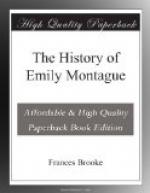I have the honor to be,
My Lord,
Your Lordship’s
&c.
William
Fermor.
LETTER 88.
To Miss Rivers, Clarges Street.
Silleri, March 16, Monday.
Your brother is come back; and has been here: he came after dinner yesterday. My Emily is more than woman; I am proud of her behaviour: he entered with his usual impatient air; she received him with a dignity which astonished me, and disconcerted him: there was a cool dispassionate indifference in her whole manner, which I saw cut his vanity to the quick, and for which he was by no means prepared.
On such an occasion I should have flirted violently with some other man, and have shewed plainly I was piqued: she judged much better; I have only to wish it may last. He is the veriest coquet in nature, for, after all, I am convinced he loves Emily.
He stayed a very little time, and has not been here this morning; he may pout if he pleases, but I flatter myself we shall hold out the longest.
Nine o’clock.
He came to dine; we kept up our state all dinner time; he begged a moment’s conversation, which we refused, but with a timid air that makes me begin to fear we shall beat a parley: he is this moment gone, and Emily retired to her apartment on pretence of indisposition: I am afraid she is a foolish girl.
Half hour after six.
It will not do, Lucy: I found her in tears at the window, following Rivers’s carriole with her eyes: she turned to me with such a look—in short, my dear,
“The weak, the fond, the fool, the coward woman”
has prevailed over all her resolution: her love is only the more violent for having been a moment restrained; she is not equal to the task she has undertaken; her resentment was concealed tenderness, and has retaken its first form.
I am sorry to find there is not one wise woman in the world but myself.
Past ten.
I have been with her again: she seemed a little calmer; I commended her spirit; she disavowed it; was peevish with me, angry with herself; said she had acted in a manner unworthy her character; accused herself of caprice, artifice, and cruelty; said she ought to have seen him, if not alone, yet with me only: that it was natural he should be surprized at a reception so inconsistent with true friendship, and therefore that he should wish an explanation; that her Rivers (and why not Madame Des Roches’s Rivers?) was incapable of acting otherwise than as became the best and most tender of mankind, and that therefore she ought not to have suffered a whisper injurious to his honor: that I had meant well, but had, by depriving her of Rivers’s friendship, which she had lost by her haughty behaviour, destroyed all the happiness of her life.
To be sure, your poor Bell is always to blame: but if ever I intermeddle between lovers again, Lucy—




